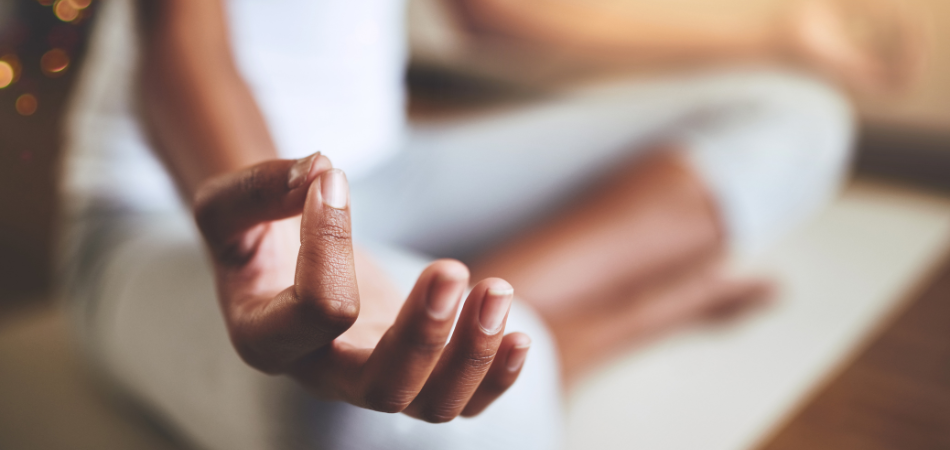
Written by:
Last Updated:
March 10th, 2025
Meditation Therapy | Benefits and How it is Implemented
If you are suffering from addiction, meditation may seem like the last thing that could help.
However, meditation has proven to be very effective in addiction therapy as it helps people to gain clarity, focus on the present and gain clearer, non-judgemental insights into their behaviour and thought processes. This newfound clarity can allow you to take back control of your feelings and actions, manage addiction cravings and triggers more effectively and learn new coping strategies for underlying mental and emotional issues which commonly lead to addiction and relapse.

What is meditation therapy?
Meditation therapy is an evidence-based therapy that has many proven benefits for people undergoing rehab treatment. A meditation therapy session will usually last for around thirty minutes to an hour as a qualified therapist leads you through a range of visualisation, breathing and mindfulness exercises. To help you focus and stay relaxed, they may incorporate music therapy, aromatherapy and other techniques.
There are a number of meditation forms that can be effective in addiction treatment such as Loving-Kindness meditation, body scan meditation and different mindfulness techniques. Each of these has its own goals and benefits but all are designed to help you gain greater insight into your thoughts and feelings so that you can recognise and alter any negative forces which are fuelling your addiction.
What does meditation for addiction at Primrose Lodge involve?
Primrose Lodge provides meditation therapy sessions as an integral part of our rehab programmes. All addictions have a significant mental and psychological element so gaining power over your emotions and thoughts through meditation is crucial for recovery.
Our meditation therapist, Julie Quiery, describes the benefits like this:
“Meditation helps to regulate your nervous system and boost your immunity. It also has many benefits for your physical and emotional health, such as reducing stress and enabling you to observe your innermost emotions and thoughts. Meditation can lead to improved quality of sleep, help you focus and give you an overriding sense of balance and inner peace.
Meditation also helps you to become aware of the present moment, reducing anxiety about the future and any guilt or depression linked to the past. These are replaced by a newfound acceptance, clear-headedness and appreciation of life. Regular meditation helps to alter the way your brain works which can improve your memory, bring mindfulness to your behaviour and have multiple benefits for every aspect of your life.
Meditation therapy in conjunction with other addiction therapies
Meditation is regularly used to complement other addiction therapies to help people with their recovery goals. When provided in unison, these therapies provide comprehensive treatment that helps to address the physical, mental and emotional elements of addiction.
One example of meditation therapy working effectively in unison with another therapy is Dialectical Behaviour Therapy (DBT). This therapy involves breaking down thoughts, behaviours and emotions into manageable parts so they don’t overwhelm you and cause addictive behaviours. Meditation can complement DBT by helping you with emotional regulation as well as an alternative perspective on the process of learning new skills such as relapse prevention.
Meditation therapy can also work in unison with group therapy in a number of ways. First of all, opening up in front of people you don’t know can be overwhelming so meditating beforehand can help to reduce feelings of stress and anxiety. The mindfulness aspect of meditation can also be a great asset in group therapy as it encourages you to concentrate on the present moment which can give you greater insight into how others are feeling and what you can learn from their experiences.
Does meditation for addiction have any post-rehab benefits?
There are a number of benefits to continued meditation even after you have left rehab. These include:
- Improved sleep – Consolidating the techniques you learnt in rehab to help you relax and remain in control of your emotions can aid the quality of sleep for years to come. This is very important as withdrawal from some substances can disrupt the natural sleep cycle.
- A reduction in relapse risk – By continuing to practise meditation, you can maintain the emotional regulation skills you developed and reduce your chances of going back to old habits.
- Increased clarity – Meditating regularly allows you to be more mindful of yourself and how your thoughts and emotions may trigger addictive behaviours in certain situations.
- Stress relief – Meditation helps to bring clarity to chaotic thoughts and worries so it is a great way of reducing stress levels in everyday life and preventing you from using substances to deal with stress.
Overall, meditation for addiction is an incredibly powerful tool to have in your recovery arsenal and can be highly beneficial both during and after rehab. Combining it with other therapies and continuing your meditation practice at home can help you on your path towards lasting change and a healthier future.
Want to know more?
For more information about meditation for addiction or any aspect of our recovery programmes, get in touch with Primrose Lodge today. Our admissions team will be happy to answer any questions you have and advise you on how to get started.
Frequently asked questions
Disclaimer:
The availability of therapies may vary across UKAT centres. The specific therapies provided will be determined based on your treatment plan and the programme offered at your chosen facility. All treatments are subject to clinical assessment and programme availability at the time of admission. For further details on the therapies included in your treatment plan, please contact our admissions team.



